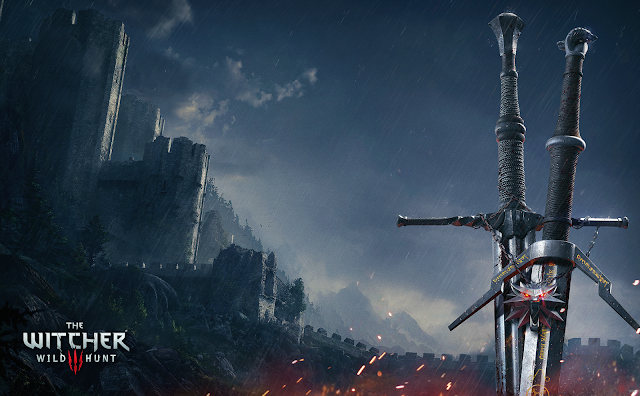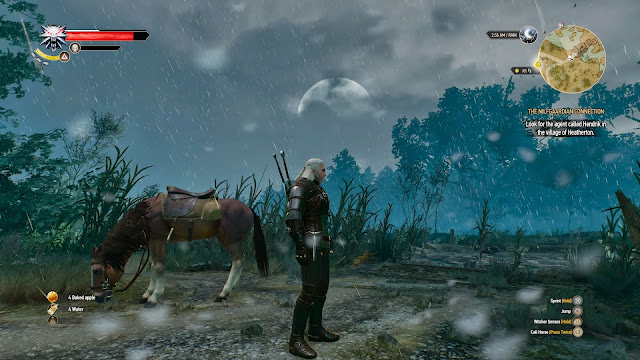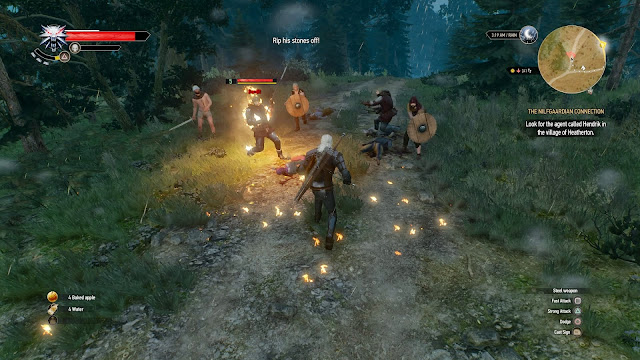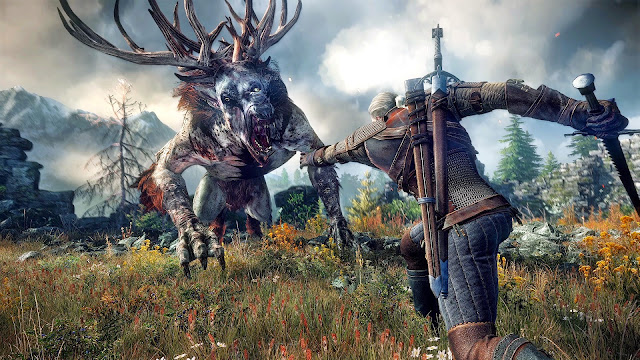The Witcher 3: Wild Hunt is the very epitome of blockbuster game design. In that lofty caste of game developers able to produce titles with obscene production values made by a veritable ant farm of workers it sits comfortably on an iron throne it carved from the bodies of its enemies, having instantly subjugated all those that came before it. Whether you look at Dragon Age, Assassin’s Creed or even Grand Theft Auto itself, it is that much harder to go back to any other open world action-adventure game having played Wild Hunt.
Objectively speaking, it is an intensely refined experience with that, if it can be faulted at all, it can only be faulted for being too ambitious at times, with the PlayStation 4 hardware complaining profusely with what the game is demanding it render. Such is the game’s scale that the occasional bug is inevitable, too. Even there, CD Projekt has shown the likes of Bethesda that “inevitable bug” with massive open worlds doesn’t need to turn into “frequent bugs,” as so often happens, and the next Elder Scrolls game will be able to hide behind none of the excuses that fans and critics so readily forgave Skyrim for back on the last generation of hardware. These faults are the faults of ambition and bravery in trying to do something well beyond what any other developer would even attempt, so they’re laudable failings.
And yet having now played The Witcher 3 for unseemly hours every day to be able to produce this review, and looking at it beyond being a technical marvel, from start to finish something has not quite sat right with me. Within the objective brilliance of the game are some very subjective issues I have with it that have meant I have really appreciated this game without ever quite having the unreserved love for it that I thought I would from my preview play sessions.
Before I try and put a finger on why I have these reservations about Wild Hunt I should also add that I absolutely loved the second Witcher game when I played it on the Xbox 360 many years ago. There seems to have been a mental shift that occurred within the creative team at CD Projekt Red when they moved from building a plucky upstart franchise, going from a niche PC-only first game and a console debut second to making Wild Hunt. When it came time to make a third title, the expectations were by all stakeholders that it would be a megahit. As such there seems to have been a serialisation to the experience that is most subtle; with the game needing to hit unprecedented sales numbers to be profitable the developers seem to have gone for epic scope for the sake of friendly screenshots, and umpteen side quests for the sake of padding. It is easy to forget after a couple of hours in Wild Hunt that its predecessor was a far more linear, focused experience, and while the world map of the game doesn’t suffer from the same deluge of icons that plagued Dragon Age: Inquisition, there’s still a sense that the developers want to constantly distract you from the main quest, with shiny distractions promising loot or new enemies to fight, rather than provide a singular substantive narrative and being confident in the ability for the main quest to impress on its own legs.
That’s all the more surprising, because the concept of Wild Hunt is easily enough to drive a focused narrative. I make this claim having not even read the book that the game is based on; the Wild Hunt alone is a fascinating concept to build a singular, focused story around. For those not in the know, the Wild Hunt is a myth that is fairly common across most older European cultures. Our modern understanding of it comes largely from one of the Brothers Grimm (yes, those Brothers Grimm), and has a role in pagan spirituality not that dissimilar to the horsemen of the apocalypse in biblical mythology – essentially, seeing a vision of the Wild Hunt at ride is a portent for death and destruction. Given the world design of Andrzej Sapkowski’s – the author of the Witcher novels – is apparently all about Game of Thrones-style dark fantasy and exposing the ugly side of human nature (as we saw play out in the previous two Witcher games – I didn’t come into this one completely ignorant on the fiction), the Wild Hunt as a concept is a perfect pairing for Geralt and his heroics (dubious as they often are).
So players find themselves starting out in a dark fantasy world in the midst of actual war, with bodies hanging from nooses in trees and battlefields and gore a-plenty. It’s the perfect environment for the Wild Hunt to show up and wreak havoc, even as humans do worse to one another, and that in turn is the perfect playground for a setting that is uncompromisingly brutal. The core of most of the people in this world are so rotten that it’s difficult to feel too much sympathy for too many people, and that’s just as well, because in order to actually achieve what you need to through the narrative you’re going need to constantly remind yourself that witchers, such as Geralt, are mercenaries and do need to ask for money for doing ‘good deeds’.
Further to this, as with Game of Thrones, trying to be too noble is a quick way to pain. Right from the start CD Projekt Red wants you be unsure of how people will respond to anything you do for them, ramming this idea home to you when a seemingly benevolent military leader convinces you to help out the village by slaying a monster (and thus improving his own credibility as a protector for the people), only to turn out to be a violent monster himself in having a villager whipped for not providing him with enough good food (and, as it turns out, being responsible for the monster’s attacks on the village in the first place). Then he offers Geralt coin for his services – but taking it or not can have additional consequences.
Too often in modern fantasy “moral ambiguity” is translated to mean “amorality abound,” and while Wild Hunt does go that direction at times (and over the course of an 80 hour-odd adventure, the relentless bleakness does become draining), the writing is strong and the performances are compelling. Even when the side quests are little more than glorified “fetch and/or kill” quests, the little narrative vignettes that open and close each of them help deliver a believable world to explore, and there are nice little touches that show real confidence from the developers. For example, following a quest marker I came across a hut that housed orphaned children, hiding from the tides of war and quite starving. I had Geralt give them some food, and that was the end of that quest. Pitted against the disappointment of having players follow a marker to no “gameplay,” CD Projekt Red took the opportunity to do some role playing, and I appreciated the decision to do that.
Later on I walked into an inn as a bunch of bandits came by for their evening beers. After a hostile conversation that ended without bloodshed, the bandits went about their drinking, only to start joking about raping some farmer’s daughter. So I killed them, and was happy to deal with the consequences of doing so. There is much more freedom to behave based on your own moral compass in The Witcher 3, and this means those moments where you choose to decapitate an arsehole who thinks rape is funny have a greater impact, as there is much more agency on your shoulders as the player to be making these decisions.
However, the game’s storytelling lets itself down a bit with its reliance on coming up with new, interesting combat scenarios, which is where the developers were – I guess! – forced to diverge from Sapkowski’s writings. There’s an element of mythology dilution, with the developers pulling creatures from a far wider range of histories than the books did, and while the visual representation of them is consistent throughout the adventure, they nevertheless feel a little out of place, as though this was a world thrown together out of patchwork rather than a single appropriation or homage to a single history or culture. As I noted before, I haven’t read Sapkowski’s books, so I could well be wrong here, but if the raw variety of monsters all do appear as an incohesive treatment of history in Sapkowski’s work, then it’s a weakness of the writer’s that the development team would have done well to break away from for their own game.
There’s also some little irritants that work in over the course of such a long narrative. The ethnocentrism is certainly inaccurate to any period of European history that The Witcher may have been based on, with multiculturalism being prevalent throughout the continent as far back as the Roman era. To be fair to the narrative writers any attempt to add multiculturalism would have meant they also would have needed to handle race relations, and racism was a far bigger issue back then, so I understand the desire to wash their hands of such controversies, because there is no way to handle that that wouldn’t be unpleasant for some people, and in fairness the team shows remarkably sensitivity with handling both gender and homosexuality in parts of the narrative, so don’t read the lack of ethnicity as an issue with the culture behind the team that made the game. I suspect it was more the artificial contrivance out of necessity, and my irritation with it is more because I found it to be plastic and uninspiring over the length of the whole game.
I also found the sheer size of the world a problem. Dragon Age: Inquisition had far smaller maps, and those maps were filled a greater frequency of things to do. That had its own set of frustrations (it was far too easy to get confused with the number of icons floating around everywhere), but in stark contrast I found a lot of my time in The Witcher was spent letting my horse auto-run me across roads while I kept an eye on the minimap. Fast travel is present, but that has problems of its own by breaking with the immersion created by having such large worlds to explore. I eventually came to the believe that these maps are so large simply so CD Projekt Red can have large maps as a metaphoric sales point on the back of the box, and while it’s a true technical marvel that these maps can be so large, and so consistent in their quality, I found the scale to be ultimately pointless, with vast spans of land I never felt the slightest inclination to explore.
When Wild Hunt focuses itself, though, it is an instant RPG classic. The combat is fast, bloody, but also strategic, forcing players to pay attention to both offense and defence, and punishing anyone that doesn’t make good use of terrain to prevent a horde from surrounding them. Newcomers to the series might find the early stages tough going because of the complexities hiding under this speed, but when you’ve developed a rhythm for the combat system, there’s no other game that compares in creating the impression of a masterful swordsman engaging in a dance of death. Boss battles are appropriately difficult and require real preparation from the player, too. With some of the optional questions especially, a player that doesn’t take the time to research the strengths and weaknesses of the monster they’re about to face and then use that information to brew appropriate potions and the like will be a dead player, even on the lowest difficulty level.
I also liked that the developers didn’t scale monster levels with player development. There are areas that, dozens of hours in, you’ll come across a weak enemy that you can dispatch with complete ease. Alternatively there are areas where you’ll come across monsters that you’ve got no chance against until later on. In addition to forcing players to stay somewhat on track with their adventure, this lack of compromise ultimately rewards players by making them feel really, truly powerful. It’s a stark contrast to recent Elder Scrolls games, where you never really needed to pay attention to your character levelling, knowing you could take down dragons as an under levelled hero, because the game will artificially drop their stats to be reasonably in line with your own, and I hope all games go back to the way Wild Hunt does things. It’s okay to punish a player that gets over-confident, developers!
I don’t really need to mention the visual style of the game, right? Surely you can tell from screenshots that it’s a gorgeous experience, especially in the mornings and evening as the sun rises and sets, respectively. The dynamic weather system also means that a storm can develop and come crashing down in real time, and there is nothing so hauntingly beautiful or strikingly dangerous as riding into a haunted graveyard deep at night with a storm crashing around. There are moments when this immersion is broken by the narrative because a scripted event will jump the clock to some other time and weather than what you had been experiencing moments before, but otherwise Wild Hunt is the most intensely technically beautiful and consistent game on the PlayStation 4.
I say “technically beautiful,” because the aesthetic is a predominantly dark fantasy one, and this means the standard kind of medieval landscapes, buildings, and creatures that we’ve seen a million times before. As I grow older this setting is slowly starting to wear me down (I have been playing Dungeons & Dragons since I was ten years old, after all), and I’ve grown more partial to the aesthetics of games that offer something exotic, such as in a game like Toukiden, or abstract, such as Toren or The Unfinished Swan. But to compare Wild Hunt to other games that use medieval settings, like Dragon Age or Bladestorm, is a showcase of just how advanced this game is (I still love Bladestorm, but it’s got nothing on the technical effort that went into this game).
CD Projekt Red’s game is a blockbuster in every sense of the word, and it’s hard to imagine a world where there’s a bigger or more impressive blockbuster at work in the background that hasn’t even been announced yet but will still release in 2015. With that in mind, while I’m sure that Ubisoft’s Assassin’s Creed title is going to be a big improvement on last year’s, and EA and Activision both have excellent shooters to release by Christmas, with Zelda on the Wii U being pushed to next year I’m quite comfortable with calling this now: The Witcher 3: Wild Hunt is going to be the blockbuster game of the year. It’s not the most artful, the most intelligent, or the most important, but it’s certainly going to be the most spectacular. And I know for a lot of players out there, the spectacle is all that matters.
– Matt S.
Editor-in-Chief
Find me on Twitter: @digitallydownld












